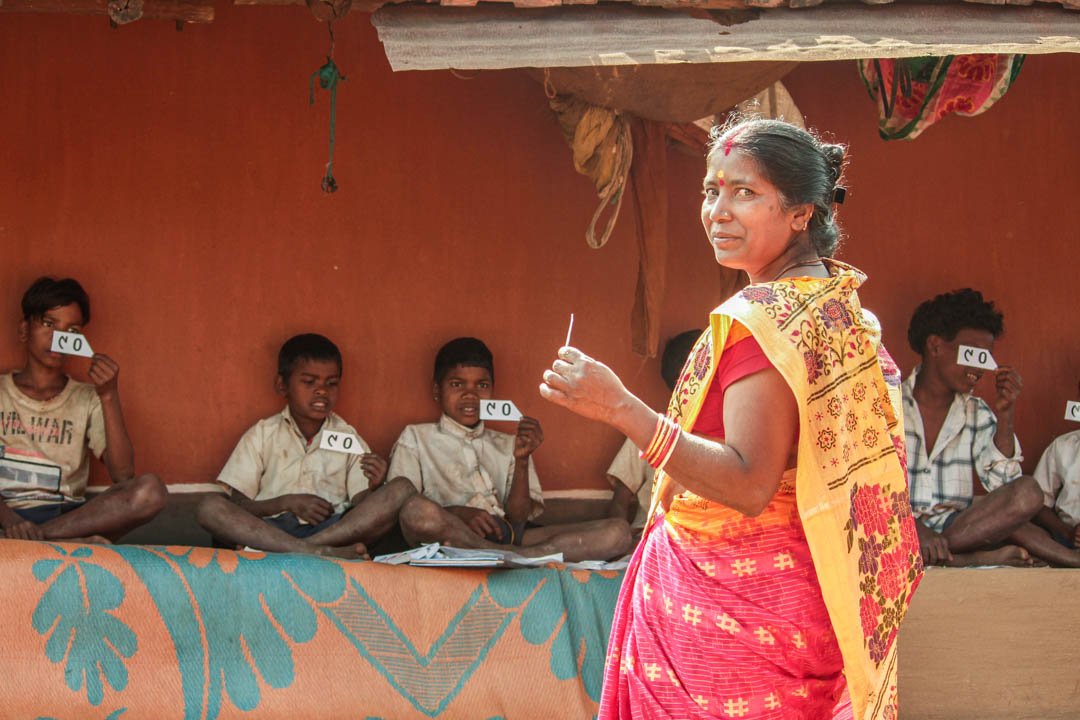In a secluded village with very limited resources, Binapani Mahanta encountered numerous formidable challenges that could have hindered her progress. Despite the scarcity of support and opportunities around her, she confronted obstacles that tested her resilience and determination. These difficulties, ranging from financial hardships to societal expectations, could have easily discouraged her, but Binapani chose to persevere, demonstrating remarkable strength in the face of adversity.
Binapani hails from a farming family in the Champua block, Kendujhar district of Odisha. Her parents supported her education until the intermediate level, but when she faced challenges in her exams, their outlook changed. Instead of continuing her studies, they pressured her to abandon her educational pursuits and enter into marriage.
Following her marriage, Binapani relocated to Chormalda, a remote village in the Joda block. This area is encircled by numerous mines and crushers but suffers from inadequate infrastructure, including poorly maintained roads and limited internet access. Progress in the region has been sluggish, and many residents, including Binapani’s husband, face precarious employment situations, frequently losing their jobs when they are no longer required by the plant.
At first, Binapani was quite reserved and adhered to societal norms that dictated a woman’s place in the home, believing that working outside was inappropriate. However, everything changed after the birth of her first child when her husband was unexpectedly diagnosed with mouth cancer and kidney stones. Unable to continue working, he was suspended from the plant, plunging their family into despair. Faced with this uncertainty, Binapani resolved to defy societal expectations and carve out a new path for her family.
ASPIRE has extensive experience working on children’s education in such remote areas. In December 2022, they began focusing on the education of children in this region. Initial meetings with the villagers revealed that Bajrang Singh Paikra, a member of the Block Development Council, had been advocating for children’s education for a long time. Bajrang Singh says, “As a BDC member, it is my duty to ensure they get their rights. While it was impossible for me to get a school opened here, we managed to arrange for some children to stay with relatives for their education.” Despite Bajrang Singh’s efforts, ASPIRE’s survey found that 54 children in the area were out of school.
Through the NGO, she came to know about ASPIRE and applied for a position as a summer teacher. The school was located 5 km from her home, requiring her to navigate a challenging route through the jungle with frequent truck traffic. After careful consideration, she accepted the position, leaving her 3-year-old child with her sick husband and walking 10 km each day to teach. Her performance in the classroom garnered positive feedback from parents and teachers, leading to requests for ASPIRE to consider her as a permanent support teacher. However, she needed to pass her intermediate exam first. With support from her community, she retook the exam and achieved good marks, which allowed her to reapply and be selected as an ASPIRE LEP teacher.
Binapani managed a variety of responsibilities, including household chores, farming, caring for her husband, and cooking for her child, all while commuting 10 km to school. When asked about her ability to juggle these tasks, she expressed, “Ma’am, I am also human. I needed rest, but my responsibilities motivated me to keep going. There were times I forgot my lunch and went the whole day without eating. On one occasion, I fainted from hunger, and the parents in the community kindly took me in and offered me food. That experience deepened my connection with the community, making it easier for me to navigate my daily challenges.”
Binapani’s LEP habitation was entirely composed of Scheduled Tribe (ST) families, where education had not been a priority. Consequently, many children were frequently absent from school. After becoming involved with the LEP, Binapani began conducting daily home visits and organizing community meetings, which significantly improved school retention rates from 45% to 94% within just a month. Understanding the importance of making education engaging, she developed appealing Teaching-Learning Materials (TLMs) with support from ASPIRE training.
During the COVID-19 pandemic, when education was deprioritized, Binapani committed to walking 10 km each day to teach children through ASPIRE’s “Foundational Literacy and Numeracy” and “Lockdown Learning Program”. For her, fulfilling her responsibilities was paramount, and she approached her duties with diligence. Every child in her village recognized her efforts. She meticulously tracked student attendance using the “Village Education Register” (VER). Each Tuesday, she visited homes to check on school-enrolled children, and every Thursday, she conducted headcounts in schools to identify those who were absent. Additionally, every Saturday, she organized meetings with stakeholders to enhance teaching methods.
Binapani is often seen with a warm smile, no matter the circumstances. After fulfilling her daily responsibilities, she makes her way to school, where she is actively engaged in teaching. With the support of ASPIRE, she completed her graduation and is now part of the “Foundational Literacy and Numeracy” (FLN) program. Binapani is dedicated to raising her daughter to be resilient and capable of facing life’s challenges.
Binapani reflects, “Life is a journey filled with obstacles, and we must learn from every experience and person we encounter. Before becoming a teacher, I engaged in labor and domestic work. No job is insignificant; each one demands equal commitment and dedication. I am where I am today because of my patience and resilience. ASPIRE has helped me discover a new identity within my village.”
ASPIRE is immensely grateful for Binapani’s contributions, recognizing her as a beacon of inspiration. Even though she has the means to purchase a vehicle, she chooses to walk 10 km each day, reflecting her unwavering dedication to her work and community. Her commitment and resilience serve as a powerful reminder of the impact one individual can have in overcoming challenges and uplifting others.
